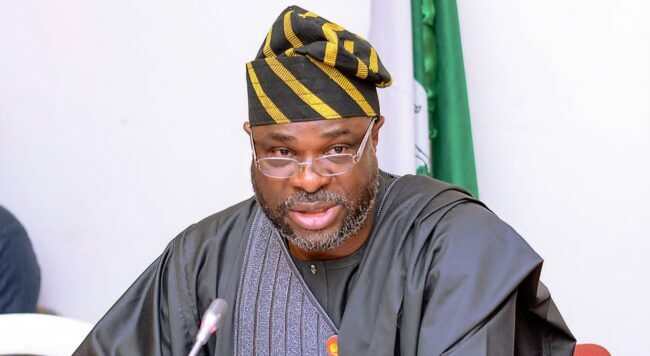Coalition of Civil Society Organizations (CSOs) in Nigeria on Wednesday expressed displeasure over the outcomes of the Conference of Parties (COP29) of the United Nations Framework Convention on Climate Change (UNFCCC), with regards to addressing the challenges posed by climate change as a result of greenhouse emissions across the globe.
The Executive Director of HOMEF, Dr. Nnimmo Bassey who gave the charge in Abuja during a press briefing on the ‘outcome of Conference of Parties (COP29) of the United Nations Framework Convention on Climate Change (UNFCCC) held its 29th session at Baku Azerbaijan on 10-24 November 2024, underscored the need for Nigeria and other African countries should place a ban on geoengineering experimentations, including solar radiation management, ocean fertilization, rock weathering and others.
While noting that the Conference tagged as ‘Finance COP’, “raised the hopes of poor, vulnerable nations that finally, climate finance would make sense, he maintained that
“They were rightly enthused by the fact that the Loss and Damage mechanism agreed to at COP27 in Egypt was endorsed at COP28 in the United Arab Emirates (UAE). However, optimists forgot that tagging COP27 an African COP did not make it an African COP. That conference was actually the fifth COP held in Africa.
He maintained that: “COP29 failed spectacularly on the finance note and the leader of the Nigerian delegation rightly called the minuscule amount offered an insult. We applaud the Director General of the Nigerian Climate Change Commission (NCCC) for her forthright submission.”
While speaking on the ‘ambitions gap’, Dr. Bassey said: Scientists inform us that 2024 is the hottest year on record. The year has also recorded a high number of disastrous weather events. The fact that climate action requires scientifically derived, binding and distributed emissions reduction cannot be denied otherwise the trend will persist.
“The UNFCCC core justice basis is the Common But Differentiated Responsibilities (CBDR). This principle requires that the rich and highly polluting nations who contributed disproportionately to the stock of greenhouse gases in the atmosphere must own up to their historical responsibility, cut emissions at source and provide finance to help the vulnerable nations that have not contributed to the problem at any significant level.
“This principle was essentially turned on its head when the Copenhagen Accord outcome of COP15 held in December 2009 signaled the ascendancy of voluntary emissions reduction by every nation — polluters and non-polluters.
“That outcome gave rise to the so-called Nationally Determined Contributions (NDCs) plank of the Paris Agreement. Nations need to show high levels of ambition in terms of emissions reduction if the world is to experience temperature levels within the limits set by the Paris Agreement. This has not happened.”
According to him, the “Emissions Gap reports issued by the United Nations Environment Programme (UNEP) in 2023 and in 2024 clearly show that if nations carry out their NDCs, the world would experience temperature increases far above the 1.5C and 2.0C targets set by the Paris Agreement.
“The latest Emissions Gap report shows that if countries continue with their current policies, the world stands a 90 per cent chance of hitting a temperature increase far above 3.6C or 3.4C if they carry on with unconditional NDCs and 3.0C with conditional reductions.
“Nations carry on as if we are not living in an emergency even though the Emissions Gap report came out just before COP29. When we consider the impacts of weather events being currently experienced at 1.1C above preindustrial levels, it is not difficult to see that the world is already in injury time.”
While reflecting on the finance gap, Dr. Bassey argued that: “the so-called finance COP was shy of mentioning how much the rich polluting nations would contribute to help vulnerable nations adapt and build resilience to the scourge. The figures were literally kept to the dying hours of the conference and was eventually rushed through to the disappointment of many.
“Talks of loss and damage and other instruments of climate finance became largely muted. In their place emerged a contentious concept of New Collective Quantified Goals (NCQG) – a new mechanism requiring that everyone contributes to the finance pot in the same thought pattern that birthed the Nationally Determined Contributions (NDC), the hallmark of voluntary emissions reduction according to convenience.
“We recall that at COP15 in 2009 the pledge was to pay $10 billion dollars yearly from 2010 to 2020 and raise that to $100 billion from 2020. Those targets never materialized. The New Collective Quantified Goal (NCQG) was presented as a means of raising funds needed to support mitigation, adaptation, and loss and damage in developing and climate-vulnerable countries, found mostly in the Global South.
“The amount needed was put at a minimum of $1.3 trillion annually, although civil society analysts put the climate debt at $5-8 trillion annually.
“COP 29 came up with a miserly $300 billion which would come into effect in 2035. The COP clearly ignored the call of vulnerable nations and global civil society and Indigenous peoples for rich and historically responsible nations to pay up and to do so in Trillions not Billions.
“When the COP deferred the date for providing needed funds to 2035 there doesn’t appear to be any consideration of the scale of the climate disasters that the world may be facing then. It has also been estimated that the $300 billion would be worth just $175 billion by then using current inflationary trend.
“Another concern is that even the promised $300 billion may come through so-called innovative financial sources that include loans and would increase the already huge debt burdens of the poor countries.
“Climate finance can readily be raised by redirecting funds from military expenditure that saw rich nations spend up to $2.4 trillion in 2023. Halting fossil fuel subsidies and holding polluters accountable would raise more than $5 trillion annually. So, the problem is not a lack of cash, but a matter of priority.”
READ MORE FROM: NIGERIAN TRIBUNE

 6 hours ago
5
6 hours ago
5













